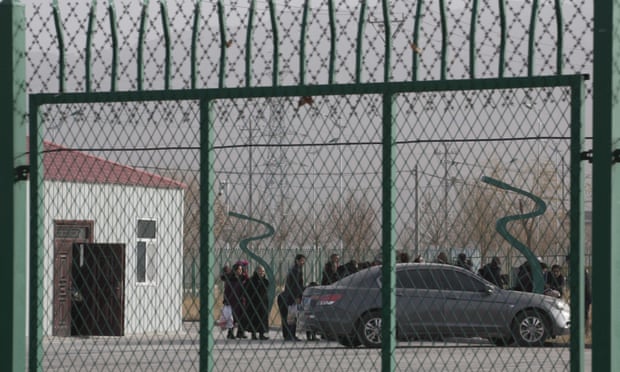American lawmakers, activists push to add China to ‘no travel’ list over arbitrary detention risks

Arbitrary detention in China has become a significant and growing concern for the international community, human rights organizations, and foreign governments.
The Chinese government has been accused of systematically using detention as a tool to suppress dissent, silence political opposition, and control minority populations.
The practice of holding individuals without due process or clear legal justification has drawn widespread criticism, with many warning that it represents a severe violation of basic human rights.
Arbitrary detention refers to the arrest or imprisonment of individuals by state authorities without sufficient legal grounds or due process.
In the case of China, arbitrary detentions are often characterized by the absence of formal charges, secret trials, and lengthy periods of imprisonment without access to legal representation or family contact.
China’s use of arbitrary detention has been documented in various contexts, including its political and judicial system, its efforts to quell dissent among ethnic and religious minorities, and its international relations.
At the hearing, Harrison Li recounted the experience of his father, Kai Li, a businessman serving a 10-year sentence in Shanghai on espionage charges.
In recent years, China has increasingly come under fire for arbitrarily arresting foreign nationals, raising concerns about the safety and legal rights of international citizens within the country.
The use of arbitrary detention as a tool for political leverage, national security enforcement, and diplomatic bargaining has drawn widespread criticism from governments, human rights organizations, and legal experts.
China’s opaque legal system and broad definitions of national security crimes have created an environment where foreigners, including business executives, journalists, and academics, are vulnerable to sudden arrest and detention without clear charges or due process.
Many experts believe China uses the arrest of foreign nationals as a form of political leverage, particularly in diplomatic disputes or when seeking concessions from other nations.
This tactic has also been seen in cases involving U.S., Australian, and European nationals, where individuals have been arrested under vaguely defined national security laws.
These arrests often coincide with broader diplomatic tensions, leading to accusations that China is using foreign detainees as bargaining chips to extract political or economic benefits.
The arbitrary arrests of foreign nationals in China have strained relations between China and several Western countries, including the United States, Canada, Australia, and the European Union.
Governments have issued travel warnings, advising citizens to exercise caution when traveling to or working in China, particularly if their roles could be perceived as politically sensitive.
Countries like Canada, the US, and the UK have warned citizens that they could be at risk of arbitrary detention in China, especially in the wake of diplomatic disputes.
This has raised concerns among expatriates and business professionals operating in China, as even routine activities could potentially lead to arrest under the guise of national security.
Recently, The Epoch Times reported that US lawmakers and families of Americans detained in China are urging the US government to elevate its travel advisory for the country to the highest level due to concerns over arbitrary arrests.
The push comes as fears mount about the safety of American citizens on Chinese soil, where accusations of wrongful detentions are increasingly reported, as per the report.
“Nobody is safe in China—nobody,” said Peter Humphrey, a former British journalist and fraud investigator, during a congressional hearing on September 18.
Humphrey, who was imprisoned in China for nearly two years, warned of the severe risks of arbitrary detention. He was one of several witnesses advocating for stronger US travel warnings.
The hearing, led by Rep. Chris Smith (R-N.J.), chairman of the Congressional-Executive Commission on China (CECC), featured testimonies from four Americans whose relatives have spent more than eight years detained in China, reports The Epoch Times.
The hearing gained attention following the release of David Lin, a naturalized American pastor, who had been imprisoned for 18 years in China.
Current US travel advisory
The US State Department currently advises Americans to reconsider travel to China, a Level 3 warning, citing concerns over the “arbitrary enforcement of local laws” that could lead to wrongful detentions or exit bans.
However, lawmakers and advocates at the hearing pushed for an upgrade to the highest advisory level, “Do Not Travel,” to prevent further detentions.
China holds more American prisoners than any other country, according to the CECC.
Estimates from Humphrey and human rights group Dui Hua Foundation suggest over 200 US citizens are subject to detention, exit bans, or other coercive measures.
“I don’t think any of them deserve to be there,” said Humphrey. “It doesn’t matter what they’re accused of—it doesn’t even matter whether they are guilty or not when they have never had a fair and transparent trial in an independent court with an impartial judge.”
Diplomatic pressure and detention as a ‘bargaining tool’
Sen. Jeff Merkley (D-Ore.) stressed the importance of addressing the issue in US-China diplomacy.
He emphasized that China’s desire for strong economic ties with the US offers leverage to push for changes in their detention practices.
“In any other dimension of our relationship with China, this has to be a central part of the conversation,” Merkley said.
Rep. Zach Nunn (R-Iowa) suggested that Beijing’s detentions could be seen as a political tactic, describing it as “building a warehouse of potential detainees” to extract concessions from the US in the future.
The prison conditions have severely deteriorated her health, with Tim revealing that his sister could no longer lift heavy objects due to uterine bleeding.
Nunn supported raising the travel advisory, but acknowledged that this was just one part of China’s broader strategy to gain leverage over the US.
Efforts to support detained Americans
Rep. Smith announced plans to introduce a bill to provide more resources for families of detained Americans in China and develop strategies to secure their release.
“This is American human rights being violated with impunity,” he said, highlighting the need for stronger action.
At the hearing, Harrison Li recounted the experience of his father, Kai Li, a businessman serving a 10-year sentence in Shanghai on espionage charges.
The United Nations (UN) has classified his detention as arbitrary.
Harrison shared how his father has suffered a stroke and other health issues while in prison.
“Every day I wake up, I shudder at the thought of him crammed in that tiny cell with anywhere from seven to 11 other people,” he said.
Families torn apart
The Epoch Times, in its report, also shared the heartbreaking stories of other families.
Nelson Wells Sr. described how his son, Nelson Wells Jr., was arrested in 2014 at a Chinese airport after authorities allegedly found drugs in a bag he believed contained baked goods.
Almost 10 years later, Wells Jr. remains imprisoned, enduring chronic pain, seizures, and depression.
Dawn Michelle Hunt, another American, was also arrested in 2014 on drug-related charges after being tricked into carrying a designer bag with illicit drugs sewn into the lining.
Her brother, Tim Hunt, emotionally appealed for her release, noting that she now faces the death penalty in Guangdong province.
International businesses have become more cautious in their operations, with some companies choosing to scale back or delay investment in China due to the potential risks faced by their employees.
The prison conditions have severely deteriorated her health, with Tim revealing that his sister could no longer lift heavy objects due to uterine bleeding.
When Tim finally saw his sister for the first time in 10 years this June, he was shocked by her appearance.
“She looks totally different… her gray hair, pale complexion, bulging eyes, and thin frame made her unrecognizable,” he said.
Their father, nearly 91 and battling prostate cancer, may not see her again before it’s too late, adding urgency to their plea for her release.
China’s expansive national security laws, particularly the 2014 Counter-Espionage Law and the 2015 National Security Law, have significantly heightened the risks for foreign nationals in the country.
These laws allow authorities to arrest individuals on suspicion of endangering state security, a term so broadly defined that almost any activity, from research to journalism, could be construed as a threat.
Foreigners who work in sectors like academia, journalism, or international business are especially vulnerable.
The opaque legal system makes it difficult for foreign detainees to mount a defense, as trials are often held behind closed doors with restricted access to legal representation and evidence.
The process can last for years, with detainees often kept in poor conditions and denied regular contact with family members or consular officials.
The international community has responded to China’s arbitrary detention of foreign nationals with increasing condemnation.
Governments have repeatedly called for the release of detained citizens, and human rights organizations have denounced China’s use of arbitrary detention as a violation of international law.
As the number of detained Americans grows, the country’s lawmakers are calling for stronger diplomatic measures and heightened travel warnings.
The risk of arbitrary detention has had a chilling effect on foreign nationals considering travel to China, particularly those involved in sensitive industries.
International businesses have become more cautious in their operations, with some companies choosing to scale back or delay investment in China due to the potential risks faced by their employees.
This environment of uncertainty has also complicated diplomatic relations.
Western countries, while seeking to maintain strong economic ties with China, face increasing pressure to address the human rights implications of arbitrary detention.
Governments have called for greater transparency and adherence to the rule of law, but China has consistently rejected external criticism, insisting that these detentions are lawful and necessary for national security.
However, for foreign nationals, the risk of arbitrary arrest in China serves as a stark reminder of the complexities and potential dangers of navigating the country’s legal and political landscape.
As the number of detained Americans grows, the country’s lawmakers are calling for stronger diplomatic measures and heightened travel warnings.
For the families of those held in China, the hope remains that increased awareness and government support will help bring their loved ones home safely.
Related
Major airline introduces new boarding rule at 100 airports to…
Few things test our patience quite like waiting in line—especially when someone skips ahead.For travellers, the issue is particularly aggravating at boarding
USA travel warning issued after ‘chaos’ habit banned from 100…
Published 18:00 22 Nov 2024 GMTIntroduced at dozens of airports across the States, it'll impact countless travellersA crackdown on a 'chaotic' hack used by coun
State Department issues urgent travel warning after death of American…
The State Department has issued an urgent warning to Americans travelling to Laos after a citizen died from drinking tainted alcohol. The unidentified American
‘Gate lice’ crackdown expanded to target pushy passengers
Sign up to Simon Calder’s free travel email for expert advice and money-saving discountsGet Simon Calder’s Travel emailGet Simon Calder’s Travel emailAmer









